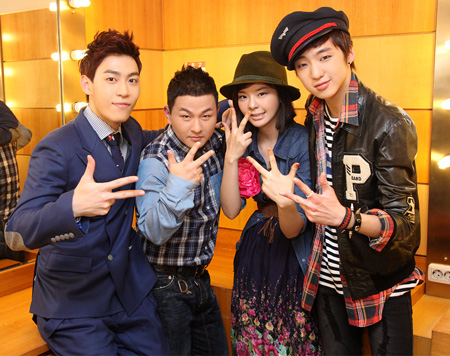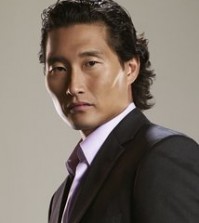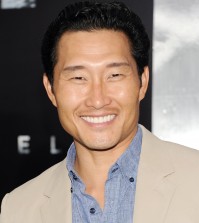- California Assembly OKs highest minimum wage in nation
- S. Korea unveils first graphic cigarette warnings
- US joins with South Korea, Japan in bid to deter North Korea
- LPGA golfer Chun In-gee finally back in action
- S. Korea won’t be top seed in final World Cup qualification round
- US men’s soccer misses 2nd straight Olympics
- US back on track in qualifying with 4-0 win over Guatemala
- High-intensity workout injuries spawn cottage industry
- CDC expands range of Zika mosquitoes into parts of Northeast
- Who knew? ‘The Walking Dead’ is helping families connect
Home is where the market is
Aspiring Korean American stars such as American Idol’s Han Hee-jun,
John Park, established stars like Daniel Dae Kim are turning to Korean market

Queens, New York’s Han Hee-jun was good enough to have made it to the finals of American Idol, but he found himself in another audition program in Korea. (Newsis)

John Park, left, poses with fellow contestants, including winner Huh Gak, of “Superstar K2” in this 2010 file photo. (Korea Times file)
Songwriter/singer Yoo Hee-yeol, who recently became a judge on a television audition program, said that when he first saw Han Hee-jun, he was admittedly waiting to see just how good the “American Idol” star was.
The 25-year-old from Queens, New York was the first Korean-American to make it to a final of “American Idol,” during season 11 of the hit show.
Han was a “star” in his own right and signed with Polaris Entertainment’s U.S. outlet. Polaris Entertainment in Korea is home to singers Kim Beom-soo and Ivy.
That “star” is now a contestant again for the audition program “K-pop Star 3” currently airing on SBS. Whether he wins or not will be decided by the three judges in a few months.
A PR representative of Polaris Entertainment said whether Han will continue to stay on with its U.S. branch remains undecided and is contingent upon the outcome of the audition program. She said that the company doesn’t necessarily seek out star-level Korean talent, as Korean agencies recruit ethnic Koreans through auditions and then train them.
But while small in number, those with traction in other markets are flowing into Korea.
Prior to Han, in 2010, Korean-American John Park created a sensation in his battle with the winner Huh Gak on the audition program“Superstar K2.” The Chicago-native was a semifinalist in season nine of “American Idol.”
After the program, Park signed with Music Farm, a music agency led by singer/songwriter Lee Juck. Park not only performs as a singer but has appeared in numerous reality entertainment shows and also made cameo appearances in small screen dramas.
Though not a singer, Korean-American actor Daniel Dae Kim recently signed with a leading talent management agency, SidusHQ. Kim, who played husband to the Korean-American actress Kim Yoon-jin in “Lost” will be looking to expand his acting career in Korea. The 46-year-old continues to star as Chin Ho Kelly in “Hawaii Five-O,” and has signed with CBS to produce a news program.
“Daniel Dae Kim has been steadily gaining fans with his unique look and genuineness in acting. We are preparing for his activities in Seoul in the nearest future,” said SidusHQ.
Korean Americans have constantly provided talent and star prowess in Korean entertainment. Tony An, a member of the now-disbanded H.O.T and Andy, a member of Shinhwa, are both Korean Americans. The most infamous is Yoo Seung-jun (a.k.a Steve Yoo), a male solo singer who was widely loved before falling to the nadir for adopting American citizenship after repeatedly saying he would serve in the Korean military. Actress Kim Yoon-jin is a Korean-American and a graduate of Boston University who broke to stardom in Korea with the epic Korean movie “Swiri.”
These stars, however, came as raw talent. People such as Han, Park, and Daniel Dae Kim are stars “re-entering” the growing market. Korean music market is estimated to be worth around 3 trillion won (about 2.8 billion USD), similar to the movie industry here, according to reports.
While album sales may have decreased, the market for concerts and festivals is growing, according to annual white papers released by the Ministry of Culture, Sports and Tourism and Korea Creative Content Agency. The Korean concert market in 2011 marked 530 billion ($497 million) won. By 2017, Korea’s domestic music performance market is expected to grow to be worth around 970 billion won ($910 million). The neighboring market in Japan is the world’s second largest music market, while the music performance market in China is steadily growing now, whereas in 2011 it stood at around 171 billion won.
The combined availability of these markets has translated into major exports for the nation’s leading entertainment agencies. In 2012, SM Entertainment recorded 103.6 billion won in exports mainly due to its top hallyu stars of TVXQ, Girls’ Generation, Super Junior and SHINee. YG Entertainment, home to Psy and Big Bang, also did pretty well, exporting about 53.4 billion won in 2012, according to news reports.















